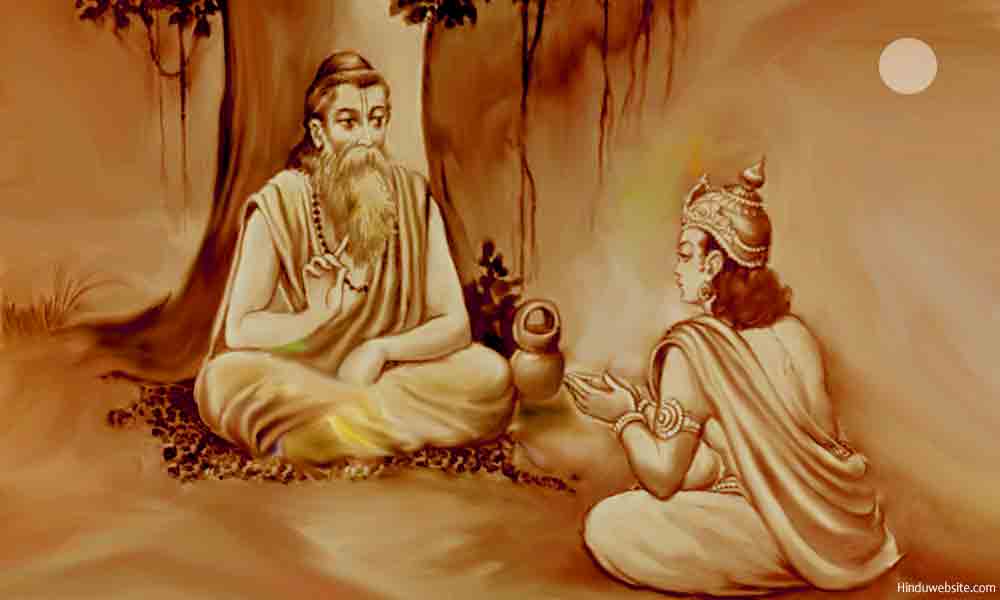
Ashtavakra Samhita, Chapter 1, Verse 3

Contents
Index, Verse 1, Verse 2, Verse 3, Verse 4, Verse 5, Verse 6, Verse 7, Verse 8, Verse 9, Verse 10, Verse 11, Verse 12, Verse 13, Verse 14, Verse 15, Verse 16, Verse 17, Verse 18, Verse 19, Verse 20
Verse 3
Na privthvi na jalam na agnir
vayuh dhahrna va bhavan
Esham sakhshim atmanam chdrupam viddhi muktaye
Translation
You are created by neither the earth nor the water nor the fire nor the air nor the space. Knowing that you are the witnessing Self in them in the form of consciousness, you will achieve liberation.
Translation
Knowing your spiritual nature
The verse introduces you to your spiritual nature. It is the first most important information in spiritual knowledge which an aspirant need to know to change his perspective and attitude towards himself and the world around him. Ignorant people consider themselves to be made up of their minds and bodies. Spiritual people know that they are neither their minds nor their bodies but spiritual beings.
In the Bhagavadgita also Krishna teaches this concept in the very beginning of his discourse. The first birth of a human being is animal birth. Their second birth is spiritual birth. It happens when they realize that they are spiritual beings and that they possess the Self as their witness consciousness. Animals have no knowledge of their spiritual nature. Only humans can know it. Hence, in certain sects of Hinduism, those who are ignorant of their spiritual nature are considered animals (pasus). God, the Supreme Self is Pasupathi, the lord of the animals.
The mind, the senses and body are made up of the five elements. Collectively they are known as the field (kshetra) or the body. It is a combination of 23 tattvas or realities of Nature and the triple gunas. They are responsible for name and form and the formation of ego or individuality in the beings. All the diversity in creation arises from the permutation and combination of gunas in the realities of Nature. The school of Advaita hold Nature as a dependent projection of the Self only.
From the Upanishads we learn how creation and diversity manifest through the admixture of the five elements and the triple gunas in varying proportions or ratios. They are responsible for the modifications of the mind and the body and the bondage of the beings to the cycle of births and deaths.
Hence, an initiate should know in the early stages that he is the eternal Self who is pure consciousness and who is different from his body and mind. He should remain a witness to them rather than become involved with them.
Sakshi (sa + akshi) means becoming one with the eyes. In a spiritual sense, it is the inner seeing, pure seeing, or pure awareness without involvement, desires and expectations. Atma means the breathing one, or your core Self, or what remains when you strip everything away from your identity and consciousness. Chit is your soul consciousness or pure consciousness. It is your highest intelligence or awareness, which manifests when your mind and senses are silent and free from the impurities of desires and expectations.
Mukti means liberation. It is the highest goal of human life. Creation is a binding mechanism, since it binds you to the world and does not easily let you go. Hence, in Hinduism, achieving liberation is more important than securing a place in heaven because even heaven has limitations.
Liberation truly means liberation from whatever that binds you and limits you. It is a state of unconditional, indestructible and infinite freedom. Why freedom is so important? It is because in this world we are limited by so many things. We cannot do whatever we want. We cannot be whatever we like. We are motivated by desires and attachments to seek things, but those very desires also limit our vision, thinking, understanding, ability, knowledge, and wisdom.
Suggestions for Further Reading
- Om, Aum, Pranava or Nada in Mantra and Yoga Traditions
- Brahmacharya or Celibacy in Hinduism
- Atheism and Materialism in Ancient India
- Solving the Hindu Caste System
- How To Choose Your Spiritual Guru?
- Creation in Hinduism As a Transformative Evolutionary Process
- Wealth and Duty in Hinduism
- Do You Have Any Plans For Your Rebirth or Reincarnation?
- Understanding Death and Impermanence
- Lessons from the Dance of Kali, the Mother Nature
- Letting your God live in You - The True Essence of the Hindu Way of Life
- prajnanam brahma - Brahman is Intelligence
- Maslow's Hierarchy Of Needs From The Perspective Of Hinduism
- The Definition and Concept of Maya in Hinduism
- The Meaning of Nirvana
- Self-knowledge, Difficulties in Knowing Yourself
- Hinduism - Sex and Gurus
- The Construction of Hinduism
- The Meaning and Significance of Heart in Hinduism
- The Origin and Significance of the Epic Mahabharata
- The True Meaning of Prakriti in Hinduism
- Three Myths about Hinduism
- What is Your Notion of God?
- Why Hinduism is a Preferred Choice for Educated Hindus
- Essays On Dharma
- Esoteric Mystic Hinduism
- Introduction to Hinduism
- Hindu Way of Life
- Essays On Karma
- Hindu Rites and Rituals
- The Origin of The Sanskrit Language
- Symbolism in Hinduism
- Essays on The Upanishads
- Concepts of Hinduism
- Essays on Atman
- Hindu Festivals
- Spiritual Practice
- Right Living
- Yoga of Sorrow
- Happiness
- Mental Health
- Concepts of Buddhism
- General Essays